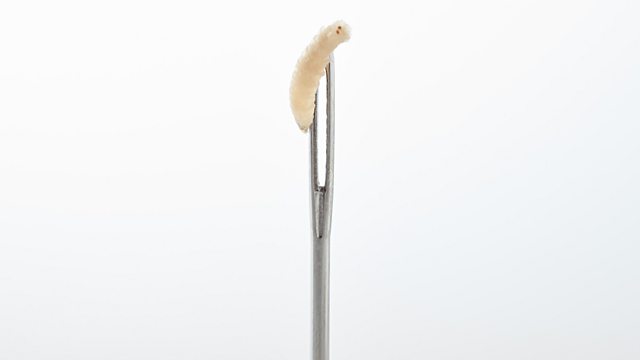Maggot therapy for difficult wounds
From egg to patient: the maggots used to clean up difficult wounds. Can we get over our disgust of maggots in order to use them to help in the fight against antibiotic resistance?
The rise of antibiotic resistance means that we need alternatives to fight infections - and some healthcare professionals are turning to maggot therapy to help clean up wounds. They might be treating people living with diabetes who can experience a loss of sensation in their feet because of high blood sugar levels. Damage to their blood vessels can also slow down healing. Melanie Rix Taylor from Swansea has type 1 diabetes and had a quarter of her foot amputated because of an infection. When the skin around the wound started to die she was offered maggot therapy. After just a few days the larvae placed on her foot in a small bag - a bit like a teabag - digested the dead skin, helping to promote healing. Her Podiatrist at Morriston hospital Ros Thomas explains how she's used maggots hundreds of times, with great success.
The larvae of the greenbottle fly species Lucilia sericata are supplied to the NHS on prescription with an average cost of Β£200-Β£300 from BioMonde in Bridgend. James visits their fly room with entomologist Micah Flores, helping him to collect some of the fly eggs which are then thoroughly cleaned and prepared so they can then be used on patients. As well as consuming dead tissue, the larvae also produce anti-microbial secretions and help to promote healing. Professor Yamni Nigam from Swansea University - who's advised television programmes like Casualty about storylines on maggot therapy - is a big fan of the creatures which have a long history of being medically useful, long before scientists found the scientific proof to support their use. She wants to help people to get over their initial disgust so that they can be used more widely, instead of as a last resort.
Photo credit: Maggot/BioMonde
Last on
Broadcasts
- Tue 17 Jan 2023 21:00Βι¶ΉΤΌΕΔ Radio 4
- Wed 18 Jan 2023 15:30Βι¶ΉΤΌΕΔ Radio 4
Discover more health facts with The Open University
Can you detect health fact from fiction?
Podcast
-
![]()
Inside Health
Series that demystifies health issues, bringing clarity to conflicting advice.


